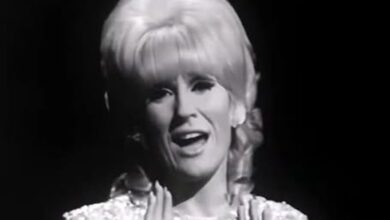Josh Turner Honors a Country Gospel Classic With Soul and Stillness
Josh Turner’s acoustic rendition of “Three Wooden Crosses” stands as a poignant tribute to one of country music’s most touching ballads. Originally performed as part of the “Forever Country” series honoring the CMA Awards, Turner’s stripped-down version carries a reverence that reflects his deep admiration for Randy Travis, a singer who helped shape Turner’s path in country music.
The song itself tells a powerful story, originally made famous by Travis in 2002. Written by Kim Williams and Doug Johnson, “Three Wooden Crosses” follows four individuals—a farmer, a teacher, a preacher, and a prostitute—on a midnight bus ride. A tragic crash leaves only one survivor, but the twist in the final verse reveals a legacy of redemption and faith.
Josh Turner’s vocal performance honors the solemnity of the lyrics. With only an acoustic guitar and minimal accompaniment, he lets the story do the heavy lifting. His deep baritone voice lends the song a gravity that captures the raw emotion behind each line, inviting listeners to sit with the weight of the story.
The narrative’s emotional arc is part of what makes it so impactful. Each character on that bus represents a walk of life, each with purpose and pain. The song draws listeners in by gradually unfolding its story until the final line offers a redemptive, spiritual gut-punch: the preacher who lived was the son of the prostitute.
Josh Turner has never hidden his gospel roots. He grew up in a devout Christian household in Hannah, South Carolina, and began singing in church at a young age. His background in gospel quartets shaped his ability to blend powerful vocal depth with spiritual messaging—qualities that come through clearly in this performance.
The connection between Turner and Randy Travis goes beyond admiration. Turner has cited Travis as one of his earliest influences, and that respect has been mutual. In fact, Turner performed this song live at a Randy Travis tribute concert in 2017, as Travis—recovering from a stroke—watched from the audience, moved by Turner’s rendition.
What sets Turner’s version apart is its stillness. In a music landscape filled with production and polish, his delivery is quiet, deliberate, and sincere. Sitting alone with a guitar, he brings the audience into the moment as if telling them a personal story rather than performing a hit.
This performance also pays tribute to the song’s award-winning legacy. “Three Wooden Crosses” earned Randy Travis the CMA Song of the Year in 2003 and also won a Dove Award for its spiritual impact. For many fans, it marked a career-defining moment for Travis—his last No. 1 hit and one that transcended traditional country boundaries.
Listeners often find themselves emotionally overwhelmed by the song’s message. On platforms like YouTube and TikTok, comments frequently include reactions like, “I can’t hear this song without tearing up,” or “This one hits deep every time.” Turner’s version only intensifies that reaction through its simplicity.
Though Turner’s delivery feels effortless, it carries the weight of legacy. His version doesn’t seek to replace Travis’s original but to honor it—reverently stepping into a sacred musical space. He interprets the lyrics not just with his voice, but with a kind of spiritual humility.
Turner’s performance has reignited interest in the song among younger audiences, many of whom first encountered it through social media. His rendition serves as both a faithful revival and a personal testimony. That duality is rare and reflects his unique ability to bridge generations.
In concert settings, Turner often speaks about faith and family between songs. His take on “Three Wooden Crosses” fits naturally into that ethos. For him, music isn’t just performance—it’s ministry. His career has often walked that line between country stardom and gospel calling.
It’s also notable that the song’s characters aren’t perfect. The inclusion of a prostitute among a preacher, farmer, and teacher reflects real-world complexity. The song doesn’t moralize—it humanizes. Turner embraces that nuance, never turning away from the uncomfortable truths embedded in the lyrics.
The line, “It’s not what you take when you leave this world behind you, it’s what you leave behind you when you go,” carries even more weight in Turner’s voice. Coming from a man whose musical career is shaped by tradition, faith, and integrity, it feels less like a lyric and more like a life motto.
In choosing to cover “Three Wooden Crosses,” Josh Turner wasn’t just honoring a great song—he was reaffirming the kind of stories that country music does best: human, heartfelt, and hopeful. His performance stands as a bridge between past and present, carrying forward a message that remains as urgent today as when it was first sung.





